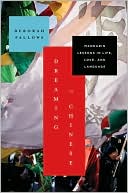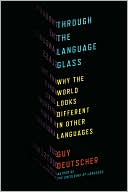Our Magnificent Bastard Tongue: The Untold History of English
A survey of the quirks and quandaries of the English language, focusing on our strange and wonderful grammar\ Why do we say “I am reading a catalog” instead of “I read a catalog”? Why do we say “do” at all? Is the way we speak a reflection of our cultural values? Delving into these provocative topics and more, Our Magnificent Bastard Language distills hundreds of years of fascinating lore into one lively history.\ Covering such turning points as the little-known Celtic and Welsh influences on...
Search in google:
A survey of the quirks and quandaries of the English language, focusing on our strange and wonderful grammarWhy do we say “I am reading a catalog” instead of “I read a catalog”? Why do we say “do” at all? Is the way we speak a reflection of our cultural values? Delving into these provocative topics and more, Our Magnificent Bastard Language distills hundreds of years of fascinating lore into one lively history.Covering such turning points as the little-known Celtic and Welsh influences on English, the impact of the Viking raids and the Norman Conquest, and the Germanic invasions that started it all during the fifth century ad, John McWhorter narrates this colorful evolution with vigor. Drawing on revolutionary genetic and linguistic research as well as a cache of remarkable trivia about the origins of English words and syntax patterns, Our Magnificent Bastard Tongue ultimately demonstrates the arbitrary, maddening nature of English— and its ironic simplicity due to its role as a streamlined lingua franca during the early formation of Britain. This is the book that language aficionados worldwide have been waiting for (and no, it's not a sin to end a sentence with a preposition). The New York Times - Ammon Shea …brief and engaging…Refreshingly, this book is neither a dry examination of academic minutiae nor an excessively simplified history. McWhorter's book is a welcome change from the sort of scholarly book in which the foundation of an idea seems often to be built on the corpses of the author's enemies…a pleasingly dissenting view—one that wears its erudition lightly.
Introduction1 We Speak a Miscegenated Grammar 12 A Lesson from the Celtic Impact 633 We Speak a Battered Grammar 894 Does Our Grammar Channel Our Thought? 1375 Skeletons in the Closet 171 Notes on Sources 199 Acknowledgments 213 Index 217
\ From Barnes & NobleOver the centuries, linguist John McWhorter (The Power of Babel) tells us, the English language has evolved in quirky ways. In fact, as he demonstrates convincingly, our "magnificent bastard tongue" has absorbed an onerous number of the grammatical equivalents of vestigial organs. Without a hint of dry pedantry, he escorts readers on a brisk Cook's tour of English's knotty origins and strange permutations.\ \ \ \ \ Ammon Shea…brief and engaging…Refreshingly, this book is neither a dry examination of academic minutiae nor an excessively simplified history. McWhorter's book is a welcome change from the sort of scholarly book in which the foundation of an idea seems often to be built on the corpses of the author's enemies…a pleasingly dissenting view—one that wears its erudition lightly.\ —The New York Times\ \ \ Publishers WeeklyThis evolutionary history of the English language from author and editor McWhorter (The Power of Babel: A Natural History of Language) isn't an easy read, but those fascinated by words and grammar will find it informative, provocative and even invigorating. McWhorter's history takes on some old mysteries and widely-believed theories, mounting a solid argument for the Celtic influence on English language that literary research has for years dismissed; he also patiently explains such drastic changes as the shift from Old English to Middle English (the differences between written and spoken language explain a lot). Those who have learned English as a second language will recognize McWhorter's assertion that "English really is easy(-ish) at first and hard later"; for that, he says, we can "blame... the Danish and Scandinavian" influence. McWhorter further proves his bona fides with deft analogies, like a comparison between the evolution of English and popping a wheelie on a bicycle; he also debunks, handily, the popular notion that "a language's grammar and the way its words pattern reflect aspects of its speakers' culture and the way they think." McWhorter's iconoclastic impulses and refreshing enthusiasm makes this worth a look for anyone with a love for the language.\ Copyright © Reed Business Information, a division of Reed Elsevier Inc. All rights reserved.\ \ \ \ \ Library JournalGrammar, not vocabulary, makes the English language intriguing, according to McWhorter (linguistics, Univ. of California, Berkeley; The Power of Babel: A Natural History of Language). He tackles the specific challenge of explaining to general readers why English grammar diverged and became simplified compared with its Germanic-language siblings. McWhorter's answer lies with speakers of Welsh and Old Norse (the Vikings). He begins by crediting Welsh for our verb conventions, especially adding the verb do to statements such as, "Do you like cheese?" and "I do not like cheese." McWhorter fingers invading Vikings for shearing off the grammatical markings added to nouns, adjectives, and verbs. Finally, he considers the common features of Germanic and Semitic languages. Throughout, McWhorter contrasts English with other languages and exposes deep controversy among scholars. In the middle of the book, he strays from English-language development, discussing intriguing questions about grammar in general. Citations to a variety of scholarly sources along with more general ones support McWhorter's arguments. This distinctive work is recommended for public libraries with large language collections.\ —Marianne Orme\ \ \








